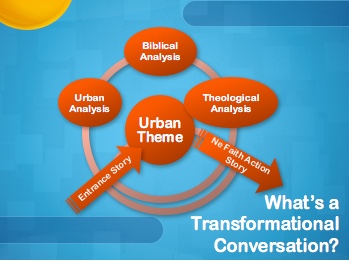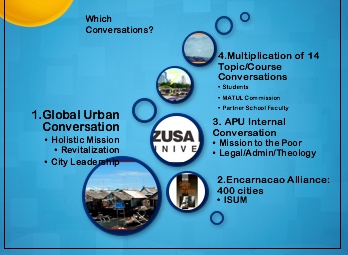Artifact #4: Transformational Conversations
Transformational Conversations

The entrance to doing theology is usually pain in the city, dislocation. It pushes workers to collectively explore the scriptures, then explore other theologians who have grappled with those discontinuities. That becomes a theological conversation. At the same time they engage in a social analysis conversation. Meshing those two becomes the transformational conversation. It is incomplete without action for God is a God of action. That action is outworked in structures that represent the theology.
What was the purpose of developing a faith to urban transformational process?
In the 1990's, as Viv lead urban consultations at the slum leaders level and at national and city leadership levels, it became apparent that Aristotolean and Western approaches to theological dogma were ineffective and culturally irrelevant. Urban workers do theology best from a story-telling motif. The role of the theologian is then to integrate those stories, identifying themes and patterns and helping refine a collective theology in a local context, an urban contextual theology.
Sources of this theological to urban approach?
This paradigm is within the genre of contextual theology, draws on Freire and other action-research methodologies(known as grounded theory in theological research). Its epistemoogy draws from Quine's motif of knowledge as a web rather than as a system built from foundaitonalism. This fits better with the complexity of urban issues. It extends the nature of doing theology into the idea that theology is expressed through structures as a logical outcome of collective reflection in the urban context.
SourcesMethodology: Transformational Conversations

This study included development of a paradigm for theological engagement with urban issues. Based on processes refined in over 30 city consultations with city leaders and urban poor workers, this is interfaced with a theory of Quine's "knowledge as webs" to generate a process that has been used by urban workers as a research paradigm...
What has been the impact?
Foundational to the process of a cluster of students developing the booklet, Towards an Auckland Business Theology which collated the stories of 12 leading Auckland business men and sought to identify the inherent theologies
Foundational to the Auckland Huis that gathered leaders across Auckland to develop the Vision for Auckland process.
Foundational to processes of training leadership networks of slum pastors.
Fondational to urban theological research: 50+ students have used this paradigm in research papers. ....
Globalization

The approach lends itself to development of theology and praxis in multiple dimensions, from global networks to instiutional to local course design.
One would not claim it has developed a life of its own, as the field of research paradigms is dense and there are parallel paradigms in the Pastoral Cycle, and Grounded Research that are popular among theologians.
Entrance => Theological Conversation => City Conversation => Transformational Conversation => Activist Structures

